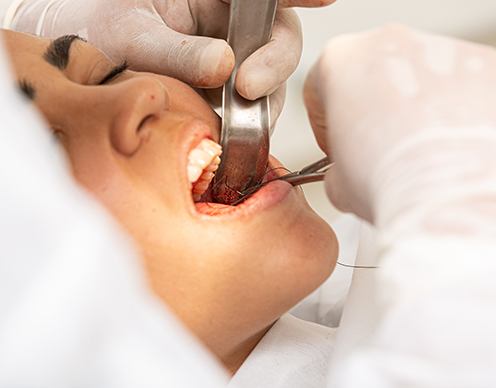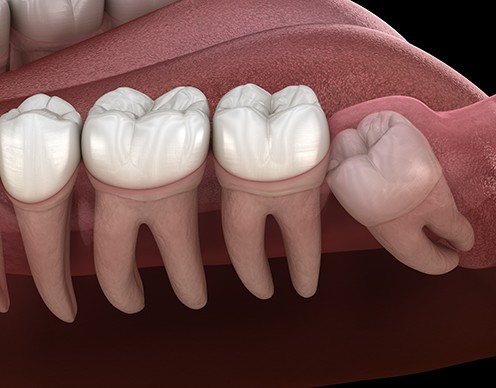Wisdom Tooth Extractions – Randolph, NJ
Stop unnecessary pain with wisdom tooth extraction
In the days of early man, wisdom teeth were necessary to replace molars worn down by primitive diets. Today, however, these teeth are largely unnecessary and can even cause a great deal of pain and damage to your existing teeth. If your wisdom teeth are impacted, infected, or causing crowding or other damage to your other teeth, your dentist may recommend extracting them.
Why Choose Randolph Dental Care for Wisdom Tooth Extractions?
- Sedation options available
- Gentle and compassionate dentists
- Dental insurance and financing accepted
What Are Wisdom Teeth?

Wisdom teeth are your third set of teeth to emerge. Sometimes called third molars, they typically appear at the very back of the arches. While today we no longer rely on these teeth to replace worn molars, they still commonly appear around the late teens to early 20s and can often cause a lot of problems.
While many people get four wisdom teeth, it is not uncommon to be born with none, one, two, three, or more. In fact, some people could have up to six! Furthermore, just because you have them doesn’t necessarily mean they’ll need to be removed, but your dentist can help make this determination as they emerge.
Why Do Wisdom Teeth Need to Be Removed?

Unfortunately, some wisdom teeth do need to be removed if they pose a serious threat to your oral health. Problems such as overcrowding, impaction, severe pain, cysts and tumors, jawbone damage, and oral hygiene issues can often arise if they are left intact.
If you are experiencing pain while eating, jaw stiffness, difficulty opening and closing your mouth, bad breath, or facial swelling, these could be signs that you should have your wisdom teeth removed.
What to Expect from the Wisdom Teeth Procedure

Your wisdom tooth extraction procedure is nothing to be afraid of. When you arrive at Randolph Dental Care, your dentist will numb your mouth before beginning any work. Once you are comfortable, your dentist will remove any wisdom teeth that have already erupted using dental forceps and an elevator.
For wisdom teeth that are impacted, your dentist will need to make incisions in your gums to reach them. Once your wisdom teeth are out, your incisions will be stitched together with dissolving sutures. These do not need to be removed and should completely dissolve within about a week or so.
Finally, your mouth will be packed with gauze to bite down on to stop any bleeding, and you will be able to return home to rest and recover for the next few days.
Recovering From Wisdom Teeth Extraction

There are several common side-effects you can expect while recovering from wisdom tooth extraction, including temporary facial swelling and bleeding.
It is very important to maintain excellent oral hygiene during recovery, including rinsing your mouth regularly and brushing gently, being sure to avoid the extraction site.
To avoid a painful condition called dry socket, do not drink from a straw or drink any carbonated beverages until you have been given the green light from your dentist.
Stick to a soft diet for the first two to three days, and then gradually adjust your diet as you heal.
Be sure to take all medications as prescribed by your dentist.
Should you have any questions or concerns at any time following your procedure, please do not hesitate to contact us as soon as possible.








